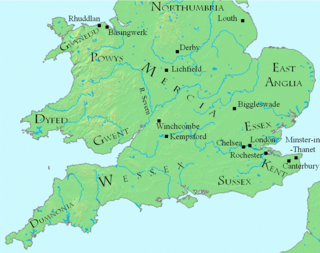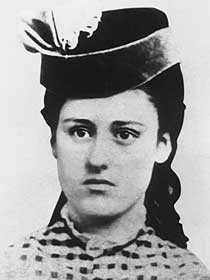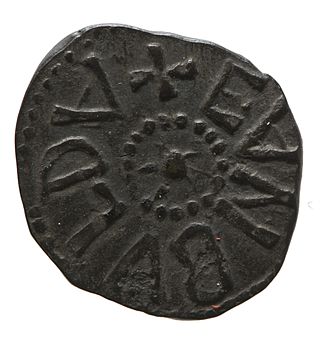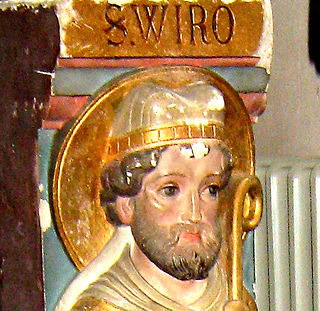Related Research Articles

Alcuin of York – also called Ealhwine, Alhwin, or Alchoin – was a scholar, clergyman, poet, and teacher from York, Northumbria. He was born around 735 and became the student of Archbishop Ecgbert at York. At the invitation of Charlemagne, he became a leading scholar and teacher at the Carolingian court, where he remained a figure in the 780s and 790s. Before that, he was also a court chancellor in Aachen. "The most learned man anywhere to be found", according to Einhard's Life of Charlemagne, he is considered among the most important intellectual architects of the Carolingian Renaissance. Among his pupils were many of the dominant intellectuals of the Carolingian era.
The 790s decade ran from January 1, 790, to December 31, 799.

Year 796 (DCCXCVI) was a leap year starting on Friday of the Julian calendar, the 796th year of the Common Era (CE) and Anno Domini (AD) designations, the 796th year of the 1st millennium, the 96th year of the 8th century, and the 7th year of the 790s decade. The denomination 796 for this year has been used since the early medieval period, when the Anno Domini calendar era became the prevalent method in Europe for naming years.

Year 798 (DCCXCVIII) was a common year starting on Monday of the Julian calendar, the 798th year of the Common Era (CE) and Anno Domini (AD) designations, the 798th year of the 1st millennium, the 98th year of the 8th century, and the 9th year of the 790s decade. The denomination 798 for this year has been used since the early medieval period, when the Anno Domini calendar era became the prevalent method in Europe for naming years.

Offa was King of Mercia, a kingdom of Anglo-Saxon England, from 757 until his death in 796. The son of Thingfrith and a descendant of Eowa, Offa came to the throne after a period of civil war following the assassination of Æthelbald. Offa defeated the other claimant, Beornred. In the early years of Offa's reign, it is likely that he consolidated his control of Midland peoples such as the Hwicce and the Magonsæte. Taking advantage of instability in the kingdom of Kent to establish himself as overlord, Offa also controlled Sussex by 771, though his authority did not remain unchallenged in either territory. In the 780s he extended Mercian Supremacy over most of southern England, allying with Beorhtric of Wessex, who married Offa's daughter Eadburh, and regained complete control of the southeast. He also became the overlord of East Anglia and had King Æthelberht II of East Anglia beheaded in 794, perhaps for rebelling against him.

Abgar V, called Ukkāmā, was the King of Osroene with his capital at Edessa.

Coenwulf was the king of Mercia from December 796 until his death in 821. He was a descendant of King Pybba, who ruled Mercia in the early 7th century. He succeeded Ecgfrith, the son of Offa; Ecgfrith only reigned for five months, and Coenwulf ascended the throne in the same year that Offa died. In the early years of Coenwulf's reign he had to deal with a revolt in Kent, which had been under Offa's control. Eadberht Præn returned from exile in Francia to claim the Kentish throne, and Coenwulf was forced to wait for papal support before he could intervene. When Pope Leo III agreed to anathematise Eadberht, Coenwulf invaded and retook the kingdom; Eadberht was taken prisoner, was blinded, and had his hands cut off. Coenwulf also appears to have lost control of the kingdom of East Anglia during the early part of his reign, as an independent coinage appears under King Eadwald. Coenwulf's coinage reappears in 805, indicating that the kingdom was again under Mercian control. Several campaigns of Coenwulf's against the Welsh are recorded, but only one conflict with Northumbria, in 801, though it is likely that Coenwulf continued to support the opponents of the Northumbrian king Eardwulf.

Willibrord was an Anglo-Saxon monk, bishop, and missionary. He became the first Bishop of Utrecht in what is now the Netherlands, dying at Echternach in Luxembourg, and is known as the "Apostle to the Frisians".

Ecgfrith was king of Mercia from 29 July to December 796. He was the son of Offa, one of the most powerful kings of Mercia, and Cynethryth, his wife. In 787, Ecgfrith was consecrated king, the first known consecration of an English king, probably arranged by Offa in imitation of the consecration of Charlemagne's sons by the pope in 781. Around 789, Offa seems to have intended that Ecgfrith marry the Frankish king Charlemagne's daughter Bertha, but Charlemagne was outraged by the request and the proposal never went forward.

Grace Greenwood Billings was an American woman, notable as a person whose correspondence, at the age of eleven, encouraged Republican Party nominee and future president Abraham Lincoln to grow a beard. Lincoln later met with Bedell during his inaugural journey in February 1861.
Eanbald I was an eighth century Archbishop of York.

Eanbald II was an eighth century Archbishop of York and correspondent of Alcuin.

Gisela was a Frankish princess and abbess. There are also two variations of her name, which are Gisele and Giselle. She was the daughter of Pepin the Short and his wife Bertrada of Laon. She was the sister of Charlemagne and Carloman.

Æthelred, was the king of Northumbria from 774 to 779 and again from 790 until he was murdered in 796. He was the son of Æthelwald Moll and Æthelthryth and possibly became king while still a child after Alhred was deposed.
Eardwulf was king of Northumbria from 796 to 806, when he was deposed and went into exile. He may have had a second reign from 808 until perhaps 811 or 830. Northumbria in the last years of the eighth century was the scene of dynastic strife between several noble families: in 790, king Æthelred I attempted to have Eardwulf assassinated. Eardwulf's survival may have been viewed as a sign of divine favour. A group of nobles conspired to assassinate Æthelred in April 796 and he was succeeded by Osbald: Osbald's reign lasted only twenty-seven days before he was deposed and Eardwulf became king on 14 May 796.

Dionysius of Corinth, also known as Saint Dionysius, was the bishop of Corinth circa AD 171. His feast day is commemorated on April 8.
Beadwulf was the last Bishop of Candida Casa to be consecrated by the Northumbrian Archbishop of York. He appears in four years of the chronicles and nowhere else. Nothing else is known of him, and his sole historical significance is that he was a bishop of the short-lived Northumbrian See of Candida Casa at Whithorn.
The Epistola de litteris colendis is a well-known letter addressed by Emperor Charlemagne to Abbot Baugulf of Fulda, probably written sometime in the late 780s to 800s (decade), although the exact date is still debatable. The letter is a very important witness to the Carolingian educational reforms during the Carolingian Renaissance from the late 8th century to the 9th century. The letter shows Emperor Charlemagne's interest in promoting learning and education within his empire.

Wiro of Roermond, also Wiro or Wera of Utrecht is a Christian saint of the 8th century. His feast day is May 8.
George was a Franco-papal diplomat who served as the bishop of Ostia (753–798) in the Papal State and bishop of Amiens (767–798) in Francia. He moved extensively between Italy and Francia, but his best recorded mission is the one he made to England in 786.
References
- ↑ Herbermann, Charles, ed. (1913). . Catholic Encyclopedia . New York: Robert Appleton Company.
- Letter extract and other information from "Osbaldwick: A suburban village" by David Wilde.